JANUARY
2012: DOWNLOAD ROUNDUP
Brian
Wilson
The second December 2011 Roundup is here
and earlier Roundups are indexed here.
Download
of the Month
La Sublime Porte: Voix d�Istanbul (The
sublime Gateway, Voices of Istanbul) 1430 � 1750
Gürsoy Dinçer (singer), Montserrat Figueras (soprano),
Lior Elmaleh (singer)
Musicians from Armenia, Turkey, Bulgaria, Israel, Greece and
Morocco
Hespèrion XXI/Jordi Savall � rec. February 2010, May
and June 2011. DDD/DSD
ALIA VOX AVSA9887 [79:49] � from emusic.com
(mp3)
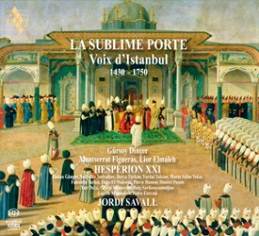 Some
Downloads of the Month choose themselves at an early stage in
my listening; this was one. There are numerous reasons: it offers
yet another most successful East/West partnership from Jordi
Savall, the music is colourful and entrancing, the performances
and recording do everything to enhance our enjoyment and, not
least, it now, sadly, serves as a fitting memorial to Mrs Savall,
Montserrat Figueras, the voice of Hespèrion XX
and XXI, who died in November 2011.
Some
Downloads of the Month choose themselves at an early stage in
my listening; this was one. There are numerous reasons: it offers
yet another most successful East/West partnership from Jordi
Savall, the music is colourful and entrancing, the performances
and recording do everything to enhance our enjoyment and, not
least, it now, sadly, serves as a fitting memorial to Mrs Savall,
Montserrat Figueras, the voice of Hespèrion XX
and XXI, who died in November 2011.
Savall has already explored the music of Istanbul, which was
and is the sublime gateway between Europe and Asia. The previous
(2009) recording concentrated on Dimitri Cantemir (1673 � 1723),
a Moldavian prince who arrived in Istanbul originally as a hostage,
and his Book of the Science of Music (AVSA9870*). This
time, too, the music in Cantemir�s manuscripts provides Savall
with much of the music as he illuminates the meeting point of
Turkish, Sephardic Jewish and Christian music, as illustrated
on the cover by the differently coloured turbans worn by Turks,
Christians and Jews.
The cost from emusic.com is £6.72 or less; those without
emusic membership can obtain the download from amazon.co.uk
� here
� for a little more (£6.99). The emusic.com bit-rate hovers
around the 210kb/s mark, which is not great but sounds more
than adequate. Audiophiles should note that the original disc
is a hybrid SACD. Though the time is perilously close to the
maximum 80-minute mark, the music all burned to CDR successfully.
There are no texts � a serious loss which I understand the SACD
booklet lavishly redeems � but a detailed essay by Jordi Savall
can be found on the Alia Vox website � here. Click on the �disc
reviews� tab. You will also find the names of the tracks there;
I haven�t listed them at the head of the review because they
would make little sense until you listen to the recording. Around
half the tracks are described as taksim, a Turkish word
meaning division and, here, signifying form of improvisation
on a makam or given theme. A small point of puzzlement:
the cover shown on the emusic.com and amazon.co.uk websites
gives the relevant dates as 1400 � 1800, that on the Alia Vox
website says, more narrowly, 1430 � 1750.
Most of the Alia Vox label�s earlier recordings are available
from emusic.com, though their per-track charging policy means
that some are incredibly inexpensive and others over-priced.
El Cant de la Sibil.la Catalunya (Song of the Sibyl,
Catalonia), one of Figueras�s most haunting recordings is especially
good value from emusic.com � here
� at £1.26. See review in November 2009 Roundup:
the nondescript cover employed then has been replaced by a much
more attractive number.
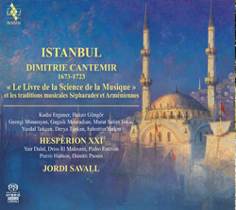 *
Download for £4.99 from amazon.co.uk
(mp3). Reviewing Savall�s disc of Jérusalem: la Ville
des deux Paix in the April 2010 Roundup,
I hoped that passionato.com would follow up with the Istanbul
and Forgotten Kingdom albums. Sadly, far from complying,
they have recently lost the Alia Vox and many other labels,
so the link in that review no longer works. Having heard the
new recording, you may well wish to obtain its fascinating predecessor,
especially at such an attractive price from amazon.co.uk; though
audiophiles will want the parent SACD and most of the tracks,
at around 220kb/s, are well short of Amazon�s usual 256kb/s,
the result sounds well enough. Again, though there are no notes,
the Alia Vox website partly compensates.
*
Download for £4.99 from amazon.co.uk
(mp3). Reviewing Savall�s disc of Jérusalem: la Ville
des deux Paix in the April 2010 Roundup,
I hoped that passionato.com would follow up with the Istanbul
and Forgotten Kingdom albums. Sadly, far from complying,
they have recently lost the Alia Vox and many other labels,
so the link in that review no longer works. Having heard the
new recording, you may well wish to obtain its fascinating predecessor,
especially at such an attractive price from amazon.co.uk; though
audiophiles will want the parent SACD and most of the tracks,
at around 220kb/s, are well short of Amazon�s usual 256kb/s,
the result sounds well enough. Again, though there are no notes,
the Alia Vox website partly compensates.
Reissue
of the Month
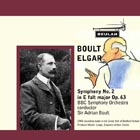 You�ll
find my Reissue of the Month among the Beulah Extra releases
below; it�s Sir Adrian Boult�s 1944 account of Elgar�s Second
Symphony. Of all the many recordings of this great work
which he made, I think this is the only one that I hadn�t encountered
before. Though I think his later thoughts in many ways an improvement
and have in mind other recordings which I wouldn�t wish to jettison,
such as Vernon Handley�s*, there�s a power in this recording
which even Boult never recaptured and Beulah�s restored sound
is little short of a miracle.
You�ll
find my Reissue of the Month among the Beulah Extra releases
below; it�s Sir Adrian Boult�s 1944 account of Elgar�s Second
Symphony. Of all the many recordings of this great work
which he made, I think this is the only one that I hadn�t encountered
before. Though I think his later thoughts in many ways an improvement
and have in mind other recordings which I wouldn�t wish to jettison,
such as Vernon Handley�s*, there�s a power in this recording
which even Boult never recaptured and Beulah�s restored sound
is little short of a miracle.
* EMI Classics for Pleasure 5753062, with Sea Pictures.
Unfortunately I can�t recommend the classicsonline.com download
� at £8.99 it�s almost twice the price of the CD � but
you can stream it from their sister site Naxos Music Library.
Nor is amazon.co.uk much better with a price of £7.76
for the download and the CD when the latter can be bought for
around £5.50. HMV Digital seem to be offering just two
tracks of Sea Pictures for £1.98!
Second
Thoughts
John TAVERNER (d.1545) Imperatrix
inferni: Votive Antiphons and Ritual Music
Quemadmodum [5:39]
Audivi vocem [3:50]
Ave Dei patris filia [14:15]
Dum transisset sabbatum [7:48]
Mater Christi [6:11]
Gaude plurimum [15:28]
[Hodie nobis celorum rex...] Gloria in excelsis Deo
[4:36]
Kyrie �Leroy�: O splendor gloriæ [11:51]
Alamire (Grace Davidson, Kirsty Hopkins, Eleanor Cramer (soprano);
Ruth Massey, Clare Wilkinson (contralto); Mark Dobell, Nicholas
Todd, Ashley Turnell, Simon Wall (tenor); Eamonn Dougan, Timothy
Scott Whiteley (baritone); William Gaunt, Robert Macdonald (bass))/David
Skinner � rec. 23-25 November 2010. DDD.
Performing editions by David Skinner
OBSIDIAN OBSID-CD707 [70:21] � from
eclassical.com (mp3 and lossless)
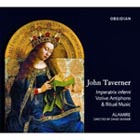 This
almost made it to Download of the Month in the November 2011/1
Roundup;
in the end it yielded to the Tallis Scholars in Josquin but
in most months it would have been an easy winner. John Quinn
also rated it highly � see review
� and I passed it over reluctantly as one of my Recordings
of the Year. I�m returning to it now because it�s become
available in lossless sound from eclassical.com and clearly
music of this complexity in performances as good as these deserves
the highest possible recording quality. If you need mp3 for
your mp3 player, eclassical.com allows you to return for this
later. The eclassical.com price of $12.53 is a little higher
than the classicsonline.com £7.99 in the UK, but there�s
not a great deal in it. Classicsonline.com offer the booklet
and eclassical.com don�t; you can, however, find notes texts
and translations here.
This
almost made it to Download of the Month in the November 2011/1
Roundup;
in the end it yielded to the Tallis Scholars in Josquin but
in most months it would have been an easy winner. John Quinn
also rated it highly � see review
� and I passed it over reluctantly as one of my Recordings
of the Year. I�m returning to it now because it�s become
available in lossless sound from eclassical.com and clearly
music of this complexity in performances as good as these deserves
the highest possible recording quality. If you need mp3 for
your mp3 player, eclassical.com allows you to return for this
later. The eclassical.com price of $12.53 is a little higher
than the classicsonline.com £7.99 in the UK, but there�s
not a great deal in it. Classicsonline.com offer the booklet
and eclassical.com don�t; you can, however, find notes texts
and translations here.
Beulah
Extra
Details of all these releases can be found here.
Pressures of time and a heavy cold over the Christmas period
mean that I�ve had to pick and choose my personal favourites
and leave some of this month�s Beulah releases over to the January
2012/2 Roundup.
George Frideric HANDEL (1685
� 1759) Solomon: Arrival of the Queen of Sheba [2:53]
London Philharmonic Orchestra/Sir Thomas Beecham � rec. 1933.
ADD/mono
11BX43 [2:53]
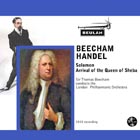 Though
this can hardly now be described as �buried� Handel, as it was
in 1933 � the Rossini Scala di Seta overture on the flip
side was also a novelty then � anything by Beecham is still
special; we wouldn�t now use the epithet �capital� any more,
either, but it is. The performance is lively and stylish and
the recording has come up very well indeed for its age. Beecham�s
Messiah, complete with everything but the kitchen sink,
may no longer be to our taste but a performance as fine as this
has a permanent appeal.
Though
this can hardly now be described as �buried� Handel, as it was
in 1933 � the Rossini Scala di Seta overture on the flip
side was also a novelty then � anything by Beecham is still
special; we wouldn�t now use the epithet �capital� any more,
either, but it is. The performance is lively and stylish and
the recording has come up very well indeed for its age. Beecham�s
Messiah, complete with everything but the kitchen sink,
may no longer be to our taste but a performance as fine as this
has a permanent appeal.
Joseph HAYDN (1732 � 1809)
Symphony No.40 in F [14:11]
Royal Philharmonic Orchestra/Sir Thomas Beecham � rec. 1948.
ADD/mono
10BX43 [14:11]
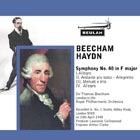 Even
now Symphony No.40 is not one of the most played Haydn works
� it�s actually much earlier than the Hoboken number suggests,
belonging properly with Nos. 13 and 14 � so I was surprised
to see that Beecham had recorded it as long ago as 1948 at a
time when even No.102 could be described as a rarity. It was
issued in a commemorative album to celebrate the conductor�s
70th birthday.
Even
now Symphony No.40 is not one of the most played Haydn works
� it�s actually much earlier than the Hoboken number suggests,
belonging properly with Nos. 13 and 14 � so I was surprised
to see that Beecham had recorded it as long ago as 1948 at a
time when even No.102 could be described as a rarity. It was
issued in a commemorative album to celebrate the conductor�s
70th birthday.
Beecham was a distinguished Haydn interpreter, as witness his
complete set of the London Symphonies, now on two EMI budget-price
twofers, and this symphony benefits from his touch. A few repeats
are omitted to conform to 78 side lengths � modern performances
run for a couple of minutes longer � but that�s not a great
problem. The recording sounds well, with very little surface
presence. Complete on one track, it�s a notable bargain.
Wolfgang Amadeus MOZART (1756
� 1791) Arias
Le Nozze di Figaro: Voi che sapete [3:03]
Così fan tutte: Come scoglio [4:24]
Suzanne Danco (soprano); La Scala Opera Orchestra, Milan/Jonel
Perlea � rec, 1947. ADD/mono
1 � 2BX177 [3:03 + 4:24]
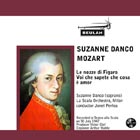 Mozart
sopranos don�t come any better than Suzanne Danco; her Cherubino
is one of the many reasons why the vintage Erich Kleiber recording
of Figaro remains my version of choice. That was still
seven years in the future when she essayed this version of the
countess�s Voi che sapete (sung by Lisa della Casa for
Kleiber) and the aria from Così; the result was
described by one original reviewer as �pleasant and competent
if unremarkable�. By 1986 John Steane was much more enthusiastic,
finding it almost impossible to fault the French Decca LP which
included these two items. Perhaps it was a case of distance
lending enchantment � now an even greater factor � but for whatever
reason I�m with JBS in enjoying Danco�s singing.
Mozart
sopranos don�t come any better than Suzanne Danco; her Cherubino
is one of the many reasons why the vintage Erich Kleiber recording
of Figaro remains my version of choice. That was still
seven years in the future when she essayed this version of the
countess�s Voi che sapete (sung by Lisa della Casa for
Kleiber) and the aria from Così; the result was
described by one original reviewer as �pleasant and competent
if unremarkable�. By 1986 John Steane was much more enthusiastic,
finding it almost impossible to fault the French Decca LP which
included these two items. Perhaps it was a case of distance
lending enchantment � now an even greater factor � but for whatever
reason I�m with JBS in enjoying Danco�s singing.
The recording is nowhere near as fresh as recent transfers of
Kleiber�s Figaro but the lack of body is not a serious
hindrance to enjoyment. Surface swish is a virtually non-existent
ghost in the background of Come scoglio, but there is
some occasional light rumble and there�s the odd spell of light
crackle in Voi che sapete.
Franz SCHUBERT (1797 � 1828)
Octet in F, D803 (Op.166) [48:35]
Vienna Octet � rec. 1948. ADD/mono
5 � 10BX168 [48:45]
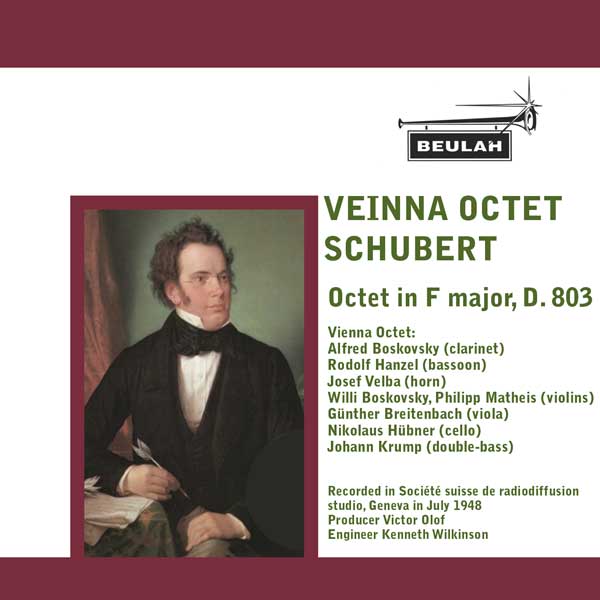 The
stylish recordings which the Vienna Octet made from the 1940s
to the 1960s contain models of performance of the classical
repertoire and beyond: I�m thinking particularly of the Trout
Quintet which they recorded with Clifford Curzon and the
Mendelssohn Octet, both of which Beulah have reissued
in good transfers. This recording of the Schubert Octet
is almost as fine � in many ways it�s still a benchmark, well
worth having as an adjunct to more recent recordings unless
you are one of those who think it a little too stylish.
The
stylish recordings which the Vienna Octet made from the 1940s
to the 1960s contain models of performance of the classical
repertoire and beyond: I�m thinking particularly of the Trout
Quintet which they recorded with Clifford Curzon and the
Mendelssohn Octet, both of which Beulah have reissued
in good transfers. This recording of the Schubert Octet
is almost as fine � in many ways it�s still a benchmark, well
worth having as an adjunct to more recent recordings unless
you are one of those who think it a little too stylish.
The Vienna Octet re-recorded this work for LP and again in stereo
� both available on Decca Eloquence � but this 1948 recording
has worn well, with only the horn sounding less than realistic.
There�s very little surface noise.
Hector BERLIOZ (1803 � 1869)
Symphonie Fantastique, Op. 14 [54:21]
Bamberg Symphony Orchestra/Jonel Perlea � rec. 1958. ADD/stereo
1 � 5BX174 [54:21]
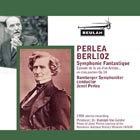 The
fact that this recording first appeared not at full price but
on Vox�s mid-price GBY label � later in stereo, too, on STGBY511090
� suggests that they didn�t have a great deal of faith in it
and it was duly castigated as unbearably slow. At £4 in
total for the five tracks, the download is quite a bargain and
the recording sounds fine, but I�d recommend paying a little
extra for the Beecham classic, recently reissued on EMI Masters
� £5.99 from classicsonline.com,
with Le Corsaire and two extracts from Les Troyens
thrown in.
The
fact that this recording first appeared not at full price but
on Vox�s mid-price GBY label � later in stereo, too, on STGBY511090
� suggests that they didn�t have a great deal of faith in it
and it was duly castigated as unbearably slow. At £4 in
total for the five tracks, the download is quite a bargain and
the recording sounds fine, but I�d recommend paying a little
extra for the Beecham classic, recently reissued on EMI Masters
� £5.99 from classicsonline.com,
with Le Corsaire and two extracts from Les Troyens
thrown in.
Compare Beecham�s 12:44 for the opening movement with Perlea�s
14:28 and you�ll see why the Rêveries do almost
send the listener to sleep at the hands of the latter. The ball
(movement 2) and the last two movements are taken quite quickly
and sound well, but the Scène aux champs (movement 3)
is again a whole two minutes slower than Beecham.
Colin Davis on his most recent recording on LSO Live is slower
than Beecham � almost as slow as Perlea in places � but he keeps
the music moving, which makes all the difference. (LSO0007 �
see review).
Compare Beecham and Davis via the Naxos Music Library but don�t
even consider buying the Davis from their sister site, classicsonline.com,
for £7.99 when the CD can be had in the UK for around
£5.50.
Pyotr Ilyich TCHAIKOVSKY (1840
� 1893) Hamlet Overture, Op.67a [14:23]
London Symphony Orchestra/Albert Coates � rec. 1932. ADD/mono
4BX124 [14:23]
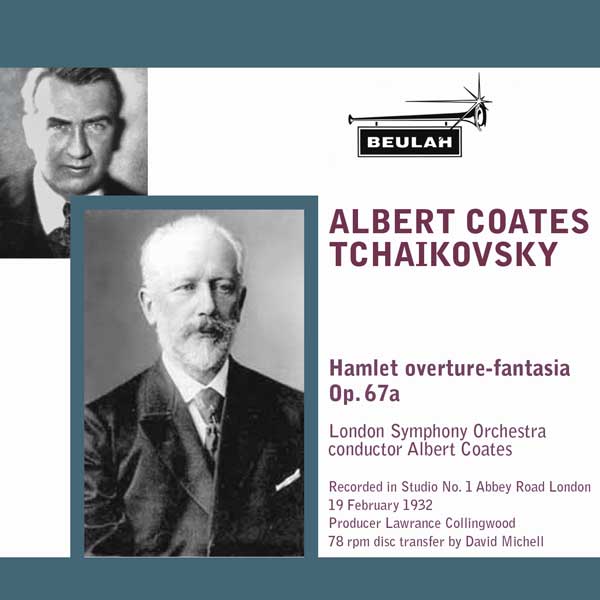 We�re
hardly short of recordings of this impassioned music � my favourite
has to be Stokowski at budget price on Everest EVERCD003, with
Francesca da Rimini � but this vintage version was well
worth reviving. The recording sounds dry but the transfer is
very good considering its age, with almost no surface noise,
and the passion of the performance comes through clearly.
We�re
hardly short of recordings of this impassioned music � my favourite
has to be Stokowski at budget price on Everest EVERCD003, with
Francesca da Rimini � but this vintage version was well
worth reviving. The recording sounds dry but the transfer is
very good considering its age, with almost no surface noise,
and the passion of the performance comes through clearly.
Antonín DVOŘ�K (1841 � 1904)
The Golden Spinning Wheel, Op.109 [24:47]
Royal Philharmonic Orchestra/Sir Thomas Beecham � rec. 1947.
ADD/mono
9BX43 [24:37]
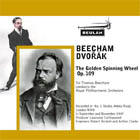 I
hadn�t thought of Beecham as a Dvoř�k interpreter; he did
record the Symphonic Variations and Symphony No.8 but neither
met with great acclaim. There are so many fine recordings of
this work � from Kubelík on DG and Mackerras on Supraphon
to name but two � that I wondered whether the Beecham magic
could win me round. In the end I have to admit to being partly
convinced; with those two much better recordings on offer, it
would have to be a Dvoř�k specialist of the calibre of
Talich to convince me to listen regularly to a recording of
this vintage.
I
hadn�t thought of Beecham as a Dvoř�k interpreter; he did
record the Symphonic Variations and Symphony No.8 but neither
met with great acclaim. There are so many fine recordings of
this work � from Kubelík on DG and Mackerras on Supraphon
to name but two � that I wondered whether the Beecham magic
could win me round. In the end I have to admit to being partly
convinced; with those two much better recordings on offer, it
would have to be a Dvoř�k specialist of the calibre of
Talich to convince me to listen regularly to a recording of
this vintage.
Modern recordings of this work tend to run about two to four
minutes longer than Beecham�s, apart from Bělohl�vek on
Chandos, whose version takes just over 22 minutes. Beecham never
seems to rush the music and, in fact, his timing is only a little
faster than Mackerras�s (coupled with Symphony No.6), good company,
indeed, in this context.
Though hailed in 1949 as of good quality, the recording is tolerable
but noticeably rougher and thinner than Beulah�s other reissues
of recordings from this period such as this month�s Beecham
Haydn Symphony No.40. Things improve as the music progresses
� maybe it was just side 1 that was problematical or my ear
adjusted. Past Classics offer this same Beecham recording �
just £0.42 from emusic.com � though their transfers tend
to be less carefully made than Beulah�s.
Sir Edward ELGAR (1857 � 1934)
BBC Symphony Orchestra/Sir Adrian Boult � rec. 1937. ADD/mono
Sospiri, Op.70 [4:14]
33BX12 [4:14]
Overture In the South (Alassio) [19:48]
BBC Symphony Orchestra/Sir Adrian Boult � rec. 1944. ADD/mono
34BX12 [19:48]
Symphony No.2 in E flat [52:37]
BBC Symphony Orchestra/Sir Adrian Boult � rec. 1944. ADD/mono
35 � 38BX12 [52:37]
The Dream of Gerontius: Prelude [9:26]
BBC Symphony Orchestra/Sir Adrian Boult � rec. 1934. ADD/mono
32BX12 [9:26]
 It�s
probably not too surprising if I give pride of place to these
Boult recordings of Elgar or that I make the Second Symphony
my Reissue of the Month. Though Boult now seems
with hindsight to have been the greatest interpreter of Elgar,
it was not always so � one correspondent to The Gramophone in
1938 avowed that his interpretation of the Second Symphony had
put him off the work for life. The first three recordings listed
above go so well together that they fit comfortably onto one
CD � burn them yourself or have Beulah do it for you for a little
extra � and the 1944 sound in particular has come up sounding
remarkably well, especially on small equipment, such as the
Roberts CD/radio in the bedroom on which I listened first.
It�s
probably not too surprising if I give pride of place to these
Boult recordings of Elgar or that I make the Second Symphony
my Reissue of the Month. Though Boult now seems
with hindsight to have been the greatest interpreter of Elgar,
it was not always so � one correspondent to The Gramophone in
1938 avowed that his interpretation of the Second Symphony had
put him off the work for life. The first three recordings listed
above go so well together that they fit comfortably onto one
CD � burn them yourself or have Beulah do it for you for a little
extra � and the 1944 sound in particular has come up sounding
remarkably well, especially on small equipment, such as the
Roberts CD/radio in the bedroom on which I listened first.
The order in which they came to me � Sospiri, then Alassio
and finally the symphony � works particularly well. EMI have
The Barbirolli recording of Sospiri with two different
catalogue numbers on the EMI Masters label, a welcome and more
recent alternative to the Boult.
If Alassio is not quite as dramatic and bustling as some
other interpretations, that allows the wistful element to come
through all the more clearly � the Northern artist�s yearning
for the South that seized even Ratty in Wind in the Willows.
The connections with Falstaff are very apparent in this
recording. If you would prefer this version of Alassio
coupled with the Nursery Suite, classicsonline.com
can oblige for £1.99.
Boult recorded the symphony many times � I made his penultimate
thoughts [not final, as Rob Barnett, the Classical Editor rightly
reminds me � there was an EMI recording in the early 1970s],
as reissued on Lyrita SRCD.221, both symphonies for the
price of one � my Reissue of the Month in the
September 2011/1 Roundup
� but this 1944 recording has a great deal going for it in such
a fine transfer. The inwardness which I find so much in evidence
in Alassio is, perhaps, the one element least developed
in Boult�s wartime recording of the symphony � many would say
that element first appeared in his 1956 Nixa recording with
the LPO* � but I don�t want to make too much of that and the
passion of the performance goes a long way towards making up.
It�s not a matter of timing: by 1956 the tempo for the first
two movements had broadened almost imperceptibly, the second
remained the same and the finale was a little faster.
In the South and the Second Symphony were recorded in
Bedford during the BBCSO�s wartime sojourn there. The sound
is inevitably a touch dry but the transfers make it sound miraculous
for its age, even when I transferred from listening on the CD/radio
to my main setup. There�s just a trace of surface noise.
The Gerontius Prelude is not often played on its own
but it, too, receives a sympathetic performance and the recording
sounds excellent for its date.
* now on a superb budget-price reissue from First Hand Records
FHR06 with much other valuable material � see review
and November 2010 Roundup.
Frederick DELIUS (1862 � 1934)
Irmelin: Prelude [5:19]
Cleveland Orchestra/George Szell � rec. 1956. ADD/mono
1BX171 [5:19] [preview on YouTube here]
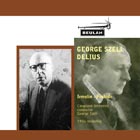 I
first encountered this recording on a CBS LP of Delius, mingled
with interpretations by Ormandy and some of the recordings which
Beecham recorded for what was originally the US partner of Columbia.
I was impressed how much other than English conductors could
get the idiom right; I should have remembered what a stickler
Szell was for getting things correct and how successful Monteux�s
Enigma Variations were. This may not be quite in that
league but I�m as impressed now as I was then. Check it out
on the YouTube link above and you�ll fall for it, too. It�s
slightly slower than Beecham�s classic performance, which it
could never replace, though it makes an attractive adjunct to
it.
I
first encountered this recording on a CBS LP of Delius, mingled
with interpretations by Ormandy and some of the recordings which
Beecham recorded for what was originally the US partner of Columbia.
I was impressed how much other than English conductors could
get the idiom right; I should have remembered what a stickler
Szell was for getting things correct and how successful Monteux�s
Enigma Variations were. This may not be quite in that
league but I�m as impressed now as I was then. Check it out
on the YouTube link above and you�ll fall for it, too. It�s
slightly slower than Beecham�s classic performance, which it
could never replace, though it makes an attractive adjunct to
it.
The CBS LP came in �electronic stereo� but Beulah have wisely
reverted to double mono, in which form the sound is a trifle
thin but far more than acceptable.
Peter WARLOCK (Philip Heseltine)
(1894 � 1930) Capriol Suite [10:44]
Boyd Neel String Orchestra/Boyd Neel � rec. 1953. ADD/mono
7BX116 [10:44]
Peter WARLOCK Serenade for
Frederick Delius [7:32]
Boyd Neel String Orchestra/Boyd Neel � rec. 1954. ADD/mono
8BX116 [7:32]
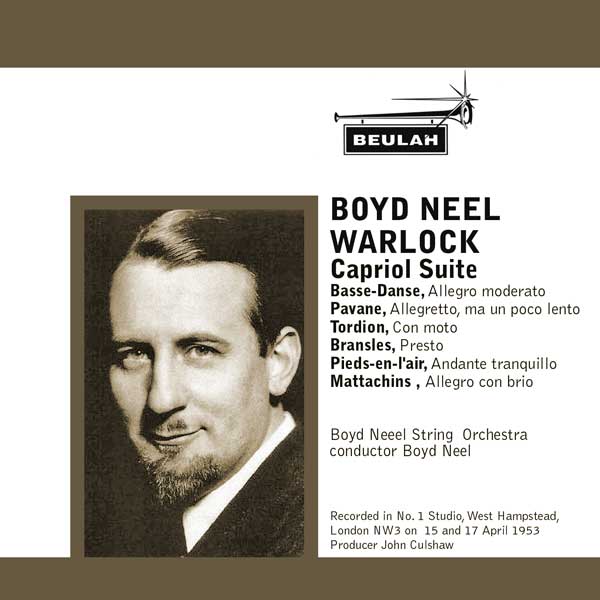 These
two reminders of the valuable recordings of English music which
the Boyd Neel Orchestra produced in the 1940s and 1950s were
first released on a 10" LP with music by Ireland. They
were reissued on Ace of Clubs along with Anthony Collins� Elgar
Falstaff. The Capriol Suite belongs to a genre
popular in the mid-20th century of baroque and earlier music
arranged for the modern orchestra. It happens to be a genre
for which I have a great liking: Respighi�s Gli Uccelli
and Ancient Airs and Dances, Stravinsky�s Pulcinella
and Walton�s The Wise Virgins to name but a few.
These
two reminders of the valuable recordings of English music which
the Boyd Neel Orchestra produced in the 1940s and 1950s were
first released on a 10" LP with music by Ireland. They
were reissued on Ace of Clubs along with Anthony Collins� Elgar
Falstaff. The Capriol Suite belongs to a genre
popular in the mid-20th century of baroque and earlier music
arranged for the modern orchestra. It happens to be a genre
for which I have a great liking: Respighi�s Gli Uccelli
and Ancient Airs and Dances, Stravinsky�s Pulcinella
and Walton�s The Wise Virgins to name but a few.
Boyd Neel and his orchestra give an excellent performance �
just the right scale for the music, which can sound too well-
upholstered in large orchestral versions. Boyd Neel is not quite
as lively as Constant Lambert (Divine Art, below) or William
Boughton with the English String Orchestra on a rather motley
collection of Orchestral Favourites (Nimbus NI7019 �
download from classicsonline.com
(mp3) or stream from Naxos Music Library). On the other
hand, I�d rather have Neel�s considered pace than Anthony Bernard�s
scramble (Divine Art, below).
The Serenade for Delius, a pretty close approximation
to that composer�s own music, is less well known and there is
only one modern recording in the current UK catalogue to the
best of my knowledge (Vernon Handley on Chandos, with Capriol
and Moeran) so the Beulah reissue is doubly welcome. Both performances
are thoroughly idiomatic � I wasn�t as troubled by the minor
discrepancies in Bransles as one original reviewer � and the
recording is vintage Decca/Culshaw early LP. Though Capriol
sounded �considerably tubby� in the ACL reincarnation, Beulah
have brought up the sound well.
Collectors of early recordings of Warlock will need also to
add to their collection a Divine Art recording which contains
two recordings each of the Serenade (Barbirolli, c.1928,
and Lambert, 1937) and Capriol (Bernard, 1931 and Lambert,
1937). (2 CDs: DDH27811 � from theclassicalshop.net
(mp3 or lossless, with pdf booklet) or classicsonline.com
(mp3) or stream from Naxos Music Library. See review
and review.
***
The Earliest Songbook in England (Cambridge
University Library MS Ff.1.17(1)) (c.1200)
Verbum patris umanatur O O [1:53]
In hoc ortus occidente [5:01]
Regis cuius potentia [1:22]
Ecce torpet probitas [3:28]
Magno gaudens gaudio [1:37]
Rerum Deus conditor [1:05]
Cantu miro [5:10]
Peter of BLOIS (1135 � 1212)
(attrib?) Vacillantis trutine [4:48]
In natali novi regis [2:31]
Diastematica [4:07]
Divino maduit [0:55]
Virgo mater salvatoris [4:03]
Tronus regis instauratur [1:11]
Benedicamus Domino: Spiritus almi [0:48]
Adulari nesciens [4:00]
Agnus Dei: Qui pius est factus [2:22]
Resonet, intonet [2:08]
Ad honorem salvatoris [1:56]
Ad honorem salvatoris [2:10]
Argumenta faluntur fisice [3:52]
Flos floriger [2:25]
Licet eger cum egrotis [4:57]
Ad cantus letitie [1:18]
Gothic Voices (Catherine King, Steven Harrold, Rogers Covey-Crump
Charles Daniels, Leigh Nixon, Stephen Charlesworth)/Christopher
Page
HYPERION HELIOS CDH55297 [63:07] � from hyperion-records.co.uk
(mp3 and lossless)
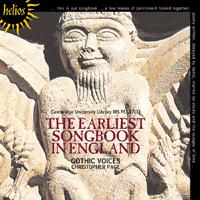 The
manuscript from which these items are excerpted exists almost
miraculously, solely because it was used to bind a later work.
All the music is anonymous but I�ve included in the list the
tentative suggestion that Peter of Blois composed at least one
of the works and may have arranged others. All the pieces included
here are in Latin, almost all are devotional in nature and many
are associated with the Christmas � New Year � Epiphany � Candlemas
period.
The
manuscript from which these items are excerpted exists almost
miraculously, solely because it was used to bind a later work.
All the music is anonymous but I�ve included in the list the
tentative suggestion that Peter of Blois composed at least one
of the works and may have arranged others. All the pieces included
here are in Latin, almost all are devotional in nature and many
are associated with the Christmas � New Year � Epiphany � Candlemas
period.
The one work to which I�ve attached Peter of Blois� name, however,
is more secular; it speaks of the vacillations of the poet�s
mind, torn between reason and love. Its theme and refrain are
more familiar from a similar song in the Carmina Burana
� both the medieval original and the Carl Orff setting:
O O O langueo!
Causam languoris video,
nec caveo,
videns et prudens pereo.
[Oh, how I languish! I see the cause of my languishing and cannot
avoid it. I perish knowingly, with my eyes open.]
The better-known song in Carmina Burana which echoes
this theme even employs the same image of a wavering pair of
scales (trutina):
In trutina mentis dubia
fluctuant contraria
lascivus amor et pudicitia.
Sed eligo quod video,
collum iugo praebeo;
ad iugum tam suave transeo.
[In the wavering balance of my mind wanton love and chastity
sway in opposite scales. But I choose what I see, I offer my
neck to the yoke; I choose to cross to a yoke so sweet.]
which Orff sets as No.21.
Don�t expect to hear anything on this recording that sounds
remotely like Carl Orff, though with their usual aplomb Gothic
Voices and Christopher Page ensure that this album is of much
more than scholarly interest and the presentation is, as usual
with Hyperion, exemplary for a budget-price recording.
I�m not sure how many more riches there are in the manuscript;
perhaps someone will record the others for us. In addition to
Christopher Page�s excellent notes, you may be interested in
http://www.lancs.ac.uk/staff/haywardp/hist422/seminars/CUL_Ff.1.17(1).htm
Orlando di LASSO (1530 or 1532
� 1594)
La Chambre Musicale d�Albert le Magnifique
Canon 15 a 3: Cantate Domino [2:58]
Novæ aliquot et ante hac non ita usitatæ cantiones
suavissimæ (excerpts) [5:30]
No.1 Beatus vir; No.2 Beatus homo; No.18 (instrumental)
Liber mottetarum: O Maria clausus hortus [2:14]
Novæ aliquot et ante hac non ita usitatæ cantiones
suavissimæ (excerpts) [2:17]
No. 4 Justus cor suum tradet; No. 3 Oculus non vidit
Selectissimæ cantiones: Cernere virtutes [2:24]
Novæ aliquot et ante hac non ita usitatæ cantiones
suavissimæ: No.13. (instrumental) [2:32]
Verbum caro factum est [1:07]
Novæ aliquot et ante hac non ita usitatæ cantiones
suavissimæ: No.14. (instrumental) [1:36]
O bone Jesu o piissime Jesu [12:16]
Novæ aliquot et ante hac non ita usitatæ cantiones
suavissimæ: No. 16. (instrumental) [2:14]
Alleluia laus et gloria [0:48]
Novæ aliquot et ante hac non ita usitatæ cantiones
suavissimæ (excerpts) [12:06]
No.21. (instrumental); No.10. (instrumental); No.23. (instrumental);
No.11. Fulgebunt justi;
No.24. (instrumental); No.12. Sicut rosa; No.22. (instrumental);
No.19. (instrumental)
Missus est Angelus Gabriel a 3 � 6: Dixit autem Maria [2:04]
Novæ aliquot et ante hac non ita usitatæ cantiones
suavissimæ (excerpts) [3:16]
No.17. (instrumental); No.5. Expectatio justorum
Missæ variis concentibus ornatæ: Diligam te Domine
[2:04]
Novæ aliquot et ante hac non ita usitatæ cantiones
suavissimæ (excerpts) [2:53]
No.6. Qui sequitur me; No.15. (instrumental)
Ego sum pauper [3:12]
Regina coeli lætare [1:45]
Novæ aliquot et ante hac non ita usitatæ cantiones
suavissimæ (excerpts) [5:18]
No.7. Justi tulerunt spolia; No.8. Sancti mei;
No. 9. Qui vult venire post me; No.20. (instrumental)
[1:47]
Adoramus te Christe [0:53]
Agimus tibi gratias [1:03]
In pace in idipsum [1:22 ]
Ad te perenne gaudium [1:04]
Resonet in laudibus [3:23]
Ensemble l�Echelle
PARATY 3760213650016 [76:19] � from classicsonline.com
(mp3) or stream from Naxos Music Library
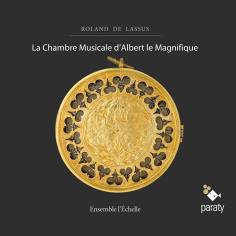 This
collection of disconnected and mainly very short pieces by Lasso/Lassus
is entertaining but not very satisfying. It�s rather like a
collection of arias from a selection of operas with no connecting
thread other than the performer(s) and, without texts or notes
I fear that it will just be a collection of sweet sounds to
most listeners. The only information with which we are provided
is what it says on the cover � that the works were composed
for the musical chamber of Albert the Magnificent � Albrecht
V, Duke of Bavaria, whose employ Lassus joined in 1556. Since
Lassus remained in Albrecht�s service and that of his son and
heir for the rest of his life, that information does little
to pinpoint the music, though you will find some dates by clicking
on the �i� icon in Naxos Music Library. Searching the outdated
Paraty web page proved fruitless � this recording is not even
listed there.
This
collection of disconnected and mainly very short pieces by Lasso/Lassus
is entertaining but not very satisfying. It�s rather like a
collection of arias from a selection of operas with no connecting
thread other than the performer(s) and, without texts or notes
I fear that it will just be a collection of sweet sounds to
most listeners. The only information with which we are provided
is what it says on the cover � that the works were composed
for the musical chamber of Albert the Magnificent � Albrecht
V, Duke of Bavaria, whose employ Lassus joined in 1556. Since
Lassus remained in Albrecht�s service and that of his son and
heir for the rest of his life, that information does little
to pinpoint the music, though you will find some dates by clicking
on the �i� icon in Naxos Music Library. Searching the outdated
Paraty web page proved fruitless � this recording is not even
listed there.
If you�re wondering about the long title that keeps cropping
up in the heading � Novæ aliquot et ante hac non ita
usitatæ cantiones suavissimæ � it�s the title
of two volumes of �most sweet songs, new and hitherto unpublished
in this form� which Lassus published in Munich in 1577; despite
the reference to cantiones (songs) in the title, twelve
of the items are purely instrumental and several of these are
included here.
The performances are decent but not ideal, with some slightly
insecure vocal and instrumental intonation at the top of the
stave. The recording is truthful but rather too forward, to
an extent which I found tiring. Overall, I must say that there
are many more desirable collections of Lassus� music, several
of which I�ve recommended in these Roundups.
Peter PHILIPS (1560/61 � 1628)
Cantiones Sacrae Quinis et Octonibus Vocibus (Antwerp
1612 & 1613)
Christus resurgens [3:45]
Disciplinam et sapientiam [2:27]
Loquebantur variis linguis [2:51]
Ne reminiscaris, Domine [2:52]
Gabriel Angelus apparuit [3:07]
Viæ Sion lugent [3:13]
Ave Jesu Christe [3:53]
Pater noster [3:40]
Beata Agnes [4:09]
Elegerunt Apostoli [3:21]
Media vita [3:40]
Ave Regina caelorum [3:38]
Ave gratia plena [3:00]
Ecce vicit Leo [3:50]
Ne timeas, Maria [1:53]
Gaude Maria virgo [3:07]
Virgo prudentissima [3:34]
Cum jucunditate [3:11]
Salve Regina [2:51]
Eia ergo [3:07]
The Sarum Consort/Andrew Mackay � rec. August, 2000. DDD
Pdf booklet included. Texts and translations available online.
NAXOS 8.572832 [65:08] � from classicsonline.com
(mp3) or stream from Naxos Music Library
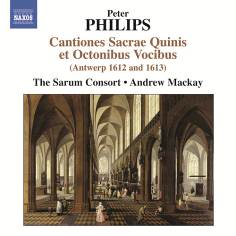 Naxos
already had a recording of the five-part Cantiones Sacræ
of Peter Philips (8.555056 � see review
and May 2010 Roundup).
Naxos
already had a recording of the five-part Cantiones Sacræ
of Peter Philips (8.555056 � see review
and May 2010 Roundup).
From their recording of music composed by All the Queen�s
Men (8.572582 � see review,
review
and April 2011 Roundup)
the Sarum Consort now turn their attention to a composer who
chose not to be one of those men but to work in exile in the
Low Countries, where he was even briefly thrown into prison
on suspicion of plotting against Elizabeth.
The Philips recordings were made as long ago as 2000, so I�m
a little perplexed as to why we have had to wait so long for
them, unless it be the inevitable overlap with the earlier Naxos
CD. Perhaps the answer lies in the fact that Sarum Consort had
recorded some of the 5-part Cantiones the previous year
for the ASV label. Maybe these recordings, too, were made for
ASV and never published � the label has had a somewhat patchy
history and even now, as part of the Universal stable, availability
is not easy.
Gary Higginson praised the ASV release highly � see review
� and I see no reason not to accord the same accolade to the
Naxos recording. Just occasionally I wondered if the singing
valued tonal perfection at the expense of involvement with the
words and, like GH, I would have preferred the soft Italianate
c, but I was not unduly troubled by either of these considerations.
I do marginally prefer rival recordings where they overlap with
the current selection, for example items from the 1612 collection
on the earlier Naxos CD (above) and on a selection on Chandos,
sung by St John�s College Choir, Cambridge (CHAN0770 � see review
and July 2010 Roundup).
Chandos, too, were tardy in releasing that 2002 recording �
are the record companies afraid that Philips won�t sell? � though
they need have had no qualms about its quality.
Several other items, both 5- and 8-part, are duplicated on a
recording by Winchester Cathedral Choir, directed by David Hill
on Hyperion�s budget Helios label (CDH55254 � see May 2010 Roundup).
While it�s a matter of swings and roundabouts in tempo between
St John�s and the Sarum Consort, the Winchester performances
have a markedly greater sense of forward motion and, for that
reason, I prefer both to the earlier Naxos set.
Currende/Erik van Nevel maintain even faster tempi in two items
by Peter Philips on their CD Ave Virgo Sanctissima, Accent
ACC24235, which I recommended in June 2011 � here.
I don�t wish to over-emphasise the differences; it�s most gratifying
to have so many recordings of this �forgotten� composer to compare
and you wouldn�t go seriously wrong with any one or more of
them.
Though the pdf booklet is part of the deal with the new Naxos
recording, you won�t find texts or translations there, but they
are available online � here
� where you will also find to which liturgical festival they
are appropriate. The mp3 sound is good.
Georg BÖHM (1661 � 1733)
Prelude and Fugue in C [5:07]
Vom Himmel hoch da komm ich her [2:19]
Nun bitten wir den heil�gen Geist [3:31]
Christe, der du bist Tag und Licht, versus 1 �
3 [1:47+5:19+2:01]
Prelude and Fugue in a minor [3:22]
Partita �Wer nur den lieben Gott lässt walten� [7:33]
Christ lag in Todesbanden, version 2 [4:14]
Christ lag in Todesbanden, version 1 [5:19]
Auf meinen lieben Gott, versus 1 � 4 [2:57+2:37+1:42+2:23]
Vater unser im Himmelreich, version 1, versus
1 � 2 [3:06+4:30]
Vater unser im Himmelreich, version 2 [6:05]
Prelude and Fugue in d minor [5:11]
Bernard Foccroulle (Schnitger organ, Groote Kerk, Alkmaar)
RICERCAR RIC319 [69:03] � from classicsonline.com
(mp3) or stream from naxos Music Library
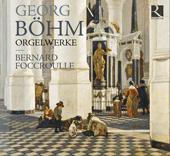 Though
he was a very important forerunner of Bach�s organ music, Böhm
is under-represented in the catalogue: he doesn�t even feature
in the last full (2010) edition of the Penguin Guide
or the current (2012) Gramophone Guide and the new recording
appears to be one of only two in the current catalogue entirely
devoted to his music, as opposed to those which juxtapose it
with Bach or other near-contemporaries. Such a programme can
be found on Dabringhaus und Grimm MDG906, where just one work
of Böhm�s can be found alongside music by Buxtehude, Scheidt,
J.S. Bach and others. Chris Bragg gave that �gorgeous release�,
on another Schnitger organ, at Nordheim, full marks � see review.
I have made a note to investigate the MDG, though I don�t think
it�s available for download, but the present release has an
even greater claim on our attention.
Though
he was a very important forerunner of Bach�s organ music, Böhm
is under-represented in the catalogue: he doesn�t even feature
in the last full (2010) edition of the Penguin Guide
or the current (2012) Gramophone Guide and the new recording
appears to be one of only two in the current catalogue entirely
devoted to his music, as opposed to those which juxtapose it
with Bach or other near-contemporaries. Such a programme can
be found on Dabringhaus und Grimm MDG906, where just one work
of Böhm�s can be found alongside music by Buxtehude, Scheidt,
J.S. Bach and others. Chris Bragg gave that �gorgeous release�,
on another Schnitger organ, at Nordheim, full marks � see review.
I have made a note to investigate the MDG, though I don�t think
it�s available for download, but the present release has an
even greater claim on our attention.
The other recording of Böhm�s organ music is on Naxos 8.555857,
recommended by Scott Montague � see review
� available from classicsonline.com
(mp3). It�s labelled Volume 1 but there doesn�t seem to have
been a successor. Though Teeuwsen employs a modern instrument
on that recording, the two approaches are very similar. Where
the repertoire overlaps, there are mere seconds of difference
in tempo. If I prefer the new recording, it�s largely because
I think that the Schnitger organ just gives it the edge. On
the other hand, there are times when I thought that Teeuwsen
found a little more joy in the music than Fouccroulle, who is
just a little more inclined to make the music sound serious.
Either recording would make a useful introduction to Böhm�s
music; both make clear his influence on Bach. The Naxos is yours
for £4.99; the Ricercar is a little more expensive at
£7.99. Neither is available in lossless sound but classicsonline.com�s
mp3 is always at the full 320kb/s bit-rate and both sound well.
You can save a few pence on the Ricercar at emusic.com, but
their bit-rates are variable and I certainly can�t guarantee
that their version comes at anywhere near 320kb/s. There are
no notes with the Ricercar download but the Naxos comes with
a pdf booklet which includes a full specification of the organ.
Subscribers to the Naxos Music Library can compare the two recordings
there.
Michel Pignolet de MONTÉCLAIR
(1667 � 1737) Cantates à voix seule
Le Retour de la Paix [15:03]
Pan et Syrinx [17:36]
Le Triomphe de la Constance [11:45]
La Mort de Didon [12:11]
La Morte di Lucretia [12:20]
Emma Kirkby (soprano)
London Baroque (Ingrid Seifert, Richard Gwilt (violin), Charles
Medlam, William Hunt (viola da gamba), Steven Devine (harpsichord))
� rec. February 2010. DDD
Pdf booklet with texts and translations included
BIS-CD-1865 [70:11] � from eclassical.com
(mp3 and 16� and 24� bit lossless)
[�Nobody who likes French baroque music should miss this disc.�
� see review
by Johan van Veen.]
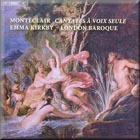 I�m
reviewing two ethereal voices on BIS this month, in very different
material: Emma Kirkby here and Katarina Karnéus in the
three Mahler song cycles (below). Montéclair is hardly
the best known French baroque composer, but this recording makes
one wonder why. Any recording by Emma Kirkby is self-recommending,
especially one made with her old friends at London Baroque.
With excellent recording and a booklet as part of the deal,
this could have been a strong contender for Download of the
Month had it not been for the Savall recording. Whoever translated
the text of le Retour de la Paix has surely misunderstood
Pourquoi, de la Parque inflexible/prévenir le fatal
ciseau? Ciseau does mean chisel (in the plural =
scissors), but Atropos or Morta, one of the Parcæ
(Fates) wielded not a chisel but what Milton calls �the abhorred
shears� (Lycidas) to cut off the strand of life � here �the
fatal cut of the shears�.
I�m
reviewing two ethereal voices on BIS this month, in very different
material: Emma Kirkby here and Katarina Karnéus in the
three Mahler song cycles (below). Montéclair is hardly
the best known French baroque composer, but this recording makes
one wonder why. Any recording by Emma Kirkby is self-recommending,
especially one made with her old friends at London Baroque.
With excellent recording and a booklet as part of the deal,
this could have been a strong contender for Download of the
Month had it not been for the Savall recording. Whoever translated
the text of le Retour de la Paix has surely misunderstood
Pourquoi, de la Parque inflexible/prévenir le fatal
ciseau? Ciseau does mean chisel (in the plural =
scissors), but Atropos or Morta, one of the Parcæ
(Fates) wielded not a chisel but what Milton calls �the abhorred
shears� (Lycidas) to cut off the strand of life � here �the
fatal cut of the shears�.
Jan Dismas ZELENKA (1679 � 1745)
Litaniæ de Venerabili Sacramento Z147 [20:53]
Regina caeli lætare Z134 [3:40]
Salve Regina, mater misericordiæ Z135 [19:00]
Lectiones from Officium defunctorum, Z47 [17:01]
Invitatorium from Officium defunctorum, Z47 [13:06]
Carolyn Sampson, Rebecca Outram (soprano)
Robin Blaze (counter-tenor)
James Gilchrist (tenor)
Michael George, Peter Harvey (bass)
The Choir of The King�s Consort
The King�s Consort/Robert King � rec. 2002. DDD.
Pdf booklet with texts and translations included.
HYPERION HELIOS CDH55424 [73:52] � from hyperion-records.co.uk
(mp3 and lossless)
Jan Dismas ZELENKA
CD 1
Officium defunctorium ZWV 47 (1733) [61:26]
CD 2
Requiem in D ZWV 46 (1733) [40:04]
Collegium 1704 and Collegium Vocale 1704/Václav Luks
� rec. June 2010 DDD
ACCENT ACC24244 [61:26 + 40:04] � from classicsonline.com
(mp3) or stream from Naxos Music Library
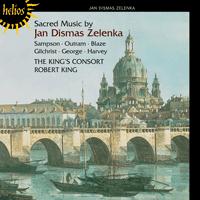 I
snuck Hyperion�s reissue of the King�s Consort recording of
the music of Kuhnau in December 2012/2 among my Christmas selections.
Also due for reissue in February, but available for download
now, is their recording of another of J.S. Bach�s contemporaries,
the Bohemian Zelenka. This was a five-star recording at full
price and it�s even more attractive now; only the existence
of the complete funeral music on Accent (below) as against the
selections here � about half the complete Officium �
limits its otherwise very high appeal. Even if you decide to
follow my advice and obtain the Accent set, the Hyperion recording
contains such fine music in addition to the Officium,
offers such superb performances, recording and notes � there
are none with the Accent download � and comes at such an economical
price in mp3 and lossless that you�ll want both. Reservations?
I dislike the hard g in Agnus Dei and Regina,
but that�s probably the sound that Zelenka heard at the Saxon
court.
I
snuck Hyperion�s reissue of the King�s Consort recording of
the music of Kuhnau in December 2012/2 among my Christmas selections.
Also due for reissue in February, but available for download
now, is their recording of another of J.S. Bach�s contemporaries,
the Bohemian Zelenka. This was a five-star recording at full
price and it�s even more attractive now; only the existence
of the complete funeral music on Accent (below) as against the
selections here � about half the complete Officium �
limits its otherwise very high appeal. Even if you decide to
follow my advice and obtain the Accent set, the Hyperion recording
contains such fine music in addition to the Officium,
offers such superb performances, recording and notes � there
are none with the Accent download � and comes at such an economical
price in mp3 and lossless that you�ll want both. Reservations?
I dislike the hard g in Agnus Dei and Regina,
but that�s probably the sound that Zelenka heard at the Saxon
court.
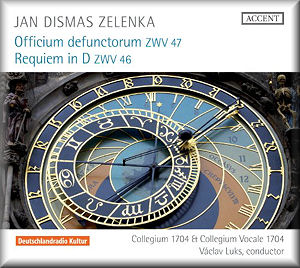 Zelenka�s
funeral music for King Friedrich August I of Poland is powerful
and dramatic rather than lugubrious. The King�s Consort 4-track
selection is fine enough, but for the whole thing you need the
Accent recording, which was one of Dominy Clements� Recordings
of the Year � see original review � and justly so. The
first disc contains the Matins of the Dead and the second, rather
short CD, the Requiem. I can�t complain about the short
playing time � any coupling would have sounded superfluous.
I can, however, bemoan the lack of texts. Performances and recording
are excellent and the classicsonline.com mp3 transfer is much
more than adequate; eclassical.com have several Accent recordings
in lossless sound, but this is not one of them.
Zelenka�s
funeral music for King Friedrich August I of Poland is powerful
and dramatic rather than lugubrious. The King�s Consort 4-track
selection is fine enough, but for the whole thing you need the
Accent recording, which was one of Dominy Clements� Recordings
of the Year � see original review � and justly so. The
first disc contains the Matins of the Dead and the second, rather
short CD, the Requiem. I can�t complain about the short
playing time � any coupling would have sounded superfluous.
I can, however, bemoan the lack of texts. Performances and recording
are excellent and the classicsonline.com mp3 transfer is much
more than adequate; eclassical.com have several Accent recordings
in lossless sound, but this is not one of them.
Mozart
Symphonies
If you prefer period performances and like the idea of buying
your Mozart symphonies in bulk, the obvious answer is the DG
Archiv budget box set of performances by the English Concert
and Trevor Pinnock (471 6662, 11CDs � see review),
available for download from passionato.com
at £40.99. (But NB: you may well find the set of CDs for
slightly less than this.) Unfortunately, I�m currently waiting
for my review access to passionato.com to be renewed, so I couldn�t
make any direct comparisons.
There is, however, a highly recommendable alternative from Charles
Mackerras and the Prague Chamber Orchestra on Telarc, on individual
discs for around £7.50 each, or as a complete set. Emusic.com
have both formats and, while I�m far from suggesting that you
spend £88 on the whole lot � here
� you can pick and choose individual symphonies � three or four
tracks for £1.46 or £1.68 from that set or from
individual discs. There are a few exceptions, where longer movements
cannot be purchased separately but only as part of the album.
The later symphonies are superseded by his SCO recordings for
Linn, but you could do very much worse than these recordings
of the earlier works.
Wolfgang Amadeus MOZART (1756 � 1791)
Symphonies vol.3 (1769 � 70)
Symphony No.9 in C, K73 [9:34]
Symphony No.�44� in D, K81 [8:45]
Symphony No.�47� in D, K97 [8:24]
Symphony No.�45� in D, K95 [9:59]
Symphony No.11 in D, K84 [10:19]
Symphony No.10 in G, K74 [7:10]
Danish Radio Sinfonietta/Adam Fischer � rec. 2006. DDD
Pdf booklet from classicsonline.com
DACAPO 6.220538 [54:11] � from classicsonline.com
(mp3 with booklet) or eclassical.com
(mp3 and lossless, no booklet) or stream from Naxos Music Library
Symphonies vol. 5 (1772)
Symphony No. 15 in G, K124 [14:15]
Symphony No. 16 in C, K128 [11:56]
Symphony No. 17 in G, K129 [14:27]
Symphony No. 18 in F, K130 [17:59]
Danish Radio Sinfonietta/Adam Fischer � rec. 2006. DDD
Pdf booklet from classicsonline.com
DACAPO 6.220540 [58:45] � from classicsonline.com
(mp3) or stream from Naxos Music Library
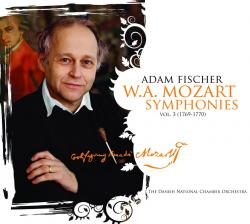 Volume
5 was the first in this planned 11-CD series to be released
and it appears to be the only one which we�ve reviewed on disc
so far. Michael Greenhalgh greatly enjoyed the performances
and recording � in twin-channel SACD and CD: see review
� and though you lose the SACD channel, the download sounds
more than well enough in good mp3.
Volume
5 was the first in this planned 11-CD series to be released
and it appears to be the only one which we�ve reviewed on disc
so far. Michael Greenhalgh greatly enjoyed the performances
and recording � in twin-channel SACD and CD: see review
� and though you lose the SACD channel, the download sounds
more than well enough in good mp3.
Volumes 3�4 and 6�8 have also been released now, all available
in good mp3 from classicsonline.com and available to stream
from the Naxos Music Library. All maintain the high standard
of Volume 5 � stylish and enjoyable modern-instrument performances
employing a fairly small orchestra and with awareness of period
practice � and the latest, Volume 3, contains works from
1769 � 1770, more than half of which are of dubious authorship,
though all are enjoyable.
All volumes are available from classicsonline.com, with booklet,
which is also available to subscribers to Naxos Music Library;
the latest is also available in lossless sound from eclassical.com,
though without booklet. As the booklet contains somewhat fanciful
thoughts about the music from Fischer � something of a mixed
blessing which, fortunately, doesn�t spoil the actual performances
� this may be no great loss. The eclassical.com price of $9.75
compares very well with classicsonline.com�s £7.99 and
the lossless version comes at the same price as the mp3 � in
fact you can even return later for the mp3 if you wish, a service
which eclassical.com shares with theclassicalshop.net, though
the latter charges extra for lossless downloads.
The brief details of the other volumes are:
* Volume 4 (Symphonies 12�14) daCapo 6.220539 [54:15]
� from classicsonline.com
(mp3) or stream from Naxos Music Library
* Volume 6 (Symphonies 19�21 and 26) daCapo 6.220541
[67:48] � from classicsonline.com
(mp3) or stream from Naxos Music Library
* Volume 7 (Symphonies 22�25 and 27) daCapo 6.220542
[64:48] � from classicsonline.com
(mp3) or stream from Naxos Music Library
* Volume 8 (Symphonies 28�30) daCapo 6.220543 [67:16]
� from classicsonline.com
(mp3) or stream from Naxos Music Library
Until Volumes 1 and 2 appear, two sources for the earliest symphonies
will do very nicely:
Wolfgang Amadeus MOZART (1756
� 1791)
Symphony No.1 in E flat, K16 [13:18]
Symphony No.2 in B flat, K17 (now attrib. Leopold
MOZART) [16:08]
Symphony No.3 in E flat, K18 (now known to be by Carl
Friedrich ABEL) [12:34]
Symphony No.4 in D, K19 [9:55]
Symphony No.5 in B flat, K22 [6:52]
Northern Chamber Orchestra/Nicholas Ward � rec. 1994. DDD.
Pdf booklet included.
NAXOS 8.550871 [58:46] � from classicsonline.com
(mp3) or stream from Naxos Music Library
Symphony No.6 in F, K43 [13:29]
Symphony No.7 in D, K45 [10:37]
Symphony No.8 in D, K48 [12:22]
Symphony No.9 in C, K73 [11:44]
Symphony No.10 in G, K74 [7:45]
Northern Chamber Orchestra/Nicholas Ward � rec. 1993. DDD.
Pdf booklet included.
NAXOS 8.550872 [55:57] � from classicsonline.com
(mp3) or stream from Naxos Music Library
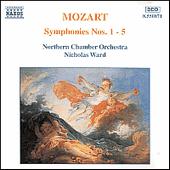
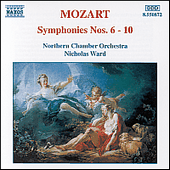 Symphony
No.2 may well be by Mozart père, Leopold, and
No.3 is now known to have been composed by Carl Friedrich Abel,
but the music is no less attractive for that � indeed, Chandos�s
series of recording of Mozart�s contemporaries has proved how
valuable these composers are in their own right. The second
volume contains works all securely attributed to the young Wolfgang.
The performances and recordings are excellent and the mp3 transfers
are good. You may even prefer the other symphonies in this series,
especially those numbered in the teens and twenties, to their
rivals. The whole series is available from classicsonline.com
and the Naxos Music Library.
Symphony
No.2 may well be by Mozart père, Leopold, and
No.3 is now known to have been composed by Carl Friedrich Abel,
but the music is no less attractive for that � indeed, Chandos�s
series of recording of Mozart�s contemporaries has proved how
valuable these composers are in their own right. The second
volume contains works all securely attributed to the young Wolfgang.
The performances and recordings are excellent and the mp3 transfers
are good. You may even prefer the other symphonies in this series,
especially those numbered in the teens and twenties, to their
rivals. The whole series is available from classicsonline.com
and the Naxos Music Library.
Wolfgang Amadeus MOZART (1756 �
1791)
Symphony No.1 in E flat, K16 [11:38]
Symphony No.25 in g minor, K183 [25:54]
Symphony No.41 in C, K551 (�Jupiter�) [36:41]
South West German Radio Symphony Orchestra/Roger Norrington
� rec. 2006. DDD
HÄNSSLER CLASSIC 93.211 [74:03] � from classicsonline.com
(mp3) or stream from Naxos Music Library
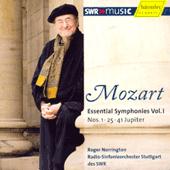 Instead
of Naxos�s chronological approach, Hänssler mix and match
works from the early, middle and late periods. The mix is especially
valuable here in that No.1 is coupled with the popular �little�
g minor and the mighty Jupiter. Unless you must have
the early symphonies together, this arrangement works well �
Naxos employ a similar mix and match approach for their Haydn
Symphony series. I�ve included this volume as representative
of the series.
Instead
of Naxos�s chronological approach, Hänssler mix and match
works from the early, middle and late periods. The mix is especially
valuable here in that No.1 is coupled with the popular �little�
g minor and the mighty Jupiter. Unless you must have
the early symphonies together, this arrangement works well �
Naxos employ a similar mix and match approach for their Haydn
Symphony series. I�ve included this volume as representative
of the series.
Though working here with a modern-instrument orchestra, Norrington
employs the exact number of players who were present at the
first performances of these symphonies and he works hard to
turn his players into a period band with a (just) audible harpsichord.
(See David Billinge�s review
of the DVD of him in rehearsal with them in Symphony No.39.)
The result is stylish and enjoyable, though I thought K16 just
a little four-square by comparison with the less expensive Naxos.
I enjoyed the dramatic account of No.25, with all repeats taken
in the outer movements, though I marginally prefer daCapo�s
placing of it on Volume 7 (above) in the company of other symphonies
from the same period, which allows us to appreciate its superiority
to them. If you want to be surprised, try Klemperer�s Vox recording
of this symphony, coupled with Symphony No.36 and Schubert Symphony
No.4 � downloadable from classicsonline.com
for £4.99. It�s not quite as fast as it looks on paper,
with repeats cut in the outer movements, but it should dispel
any notion of Klemperer as a slowcoach, a phenomenon of his
later years only. The recording is thin and scratchy, but it�s
worth the price. Even when he recorded the work later, for Columbia,
his tempi remained faster than the dour image of Klemperer would
suggest � listen to him tear into the opening allegro
with real brio on EMI 0724356733152, with Nos.29 and
31 and the Così Overture from the Naxos Music
Library; download from classicsonline.com to follow, I presume.
I normally prefer all the repeats to be observed, but I have
to admit that I actually like No.25 without them. Of all the
versions of this symphony that I�ve been considering, I�m most
taken with the performance by the Capella Istropolitana under
Barry Wordsworth on Naxos 8.550113, where they are not
observed. That 1988 recording is coupled with likeable accounts
of the single-movement No.32 and No.41 (Jupiter).
Though the Hänssler Jupiter seems remarkably consistent
within three seconds overall with Norrington�s earlier EMI (now
Virgin) recording � see below � that overall timing hides some
changes of thought in the middle movements, with the second
(adagio cantabile) now taken at a slower pace and the
minuet faster than before, perhaps as a result of reviewers�
comments in 1992. The opening movement, too, which now runs
to 10:56 (not 11:05 as stated) as opposed to 11:10 with the
LCP, benefits from a marginally faster tempo.
Played straight after either of the Norrington recordings, Wordsworth�s
tempo for the opening movement of the Jupiter on the
Naxos recording to which I�ve referred sounds deliberate, laboured
even at first, but this soon develops into a Jupiter
to live with. It�s less expensive than Norrington on Hänssler
and disc for disc not much more expensive than the Virgin Norrington.
The Capella Istropolitana, drawn from the Slovak PO, use modern
instruments but employ some period techniques, such as the use
of hard drum sticks. The recording sounds well and the download
comes with the pdf booklet, as does the Naxos Music Library
version � stream all three versions of the Jupiter from
there for comparison if you can and wish to make you own choice.
Wolfgang Amadeus MOZART (1756
� 1791) Symphonies 38�41
CD1
Symphony No. 38 in D, K504 (Prague) [36:51]
Symphony No. 40 in g minor, K550 [32:49]
CD2
Symphony No. 39 in E flat K543 [29:13]
Symphony No. 41 in C, K551 (Jupiter) [36:44]
London Classical Players/Roger Norrington � rec. 1990/91. DDD.
VIRGIN VERITAS 0724356201057 [2 CDs: 135:37] � from classicsonline.com
(mp3) or stream from Naxos Music Library
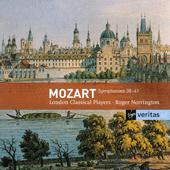 The
classicsonline.com price reflects the fact that this is a budget
reissue in the UK. It�s money well spent, but I�d still recommend
the Mackerras recording of these last four symphonies on Linn
(CKD308)
which I reviewed in the February 2009 Roundup
� modern instruments but with a real sense of period style.
The mp3 version of that set costs very little more than the
Virgin and it�s also available in a variety of 16- and 24- bit
lossless formats, none of which will break the bank.
The
classicsonline.com price reflects the fact that this is a budget
reissue in the UK. It�s money well spent, but I�d still recommend
the Mackerras recording of these last four symphonies on Linn
(CKD308)
which I reviewed in the February 2009 Roundup
� modern instruments but with a real sense of period style.
The mp3 version of that set costs very little more than the
Virgin and it�s also available in a variety of 16- and 24- bit
lossless formats, none of which will break the bank.
The Virgin release does have solid virtues of its own. Though
these are period performances, nothing here is small-scale and
over-delicate � this is no Meissen figurine representation of
Mozart. If anything, I thought some of the playing a little
too matter-of-fact. At other times the drama of the performances
comes at the cost of beauty; otherwise there is nothing that
misrepresents Mozart but nothing that I thought special either
and certainly it seems less �provocative� than it was thought
in 1992. If Mackerras�s 2-CD set on Linn is not to your taste
for some reason, the Capella Istropolitana/Barry Wordsworth
version of the Jupiter to which I�ve referred above is
alternatively coupled with No.40 on Naxos 8.550299.
Wolfgang Amadeus MOZART Duo
for violin and viola in G, KV 423 [16:16]
Michael HAYDN Duo for violin
and viola No. 1 in C, MH 335 (P127) [15:02]
Wolfgang Amadeus MOZART
Duo for violin and viola in B flat, KV 424 [20:38]
Michael HAYDN Duo for violin
and viola No. 2 in D, MH 336 (P128) [18:35]
Wolfgang Amadeus MOZART
Menuetto (from 12 Duos for Horn, KV 487) [2:01]
Rachel Podger (violin)
Jane Rogers (viola) � rec. 2010. DDD/DSD
CHANNEL CLASSICS CCSSA32411 [72:37] � from channelclassics.com
(mp3, 16- and 24-bit lossless)
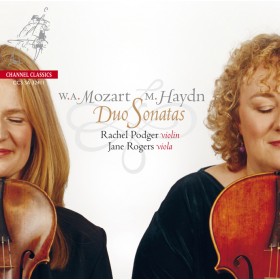 After
the symphonies, now for something completely different � at
any rate, much more small-scale. These Mozart Duos for violin
and viola are not played or recorded at all often � they are
not to be confused with the Sonatas for violin and keyboard,
which Channel Classics have also very successfully recorded,
with Rachel Podger and Gary Cooper. The only other recording
which I remember hearing, of K423, was made by the Oistrakhs,
père et fils, as a filler to their Decca recording
of the Sinfonia Concertante, K364 (SXL6088).
After
the symphonies, now for something completely different � at
any rate, much more small-scale. These Mozart Duos for violin
and viola are not played or recorded at all often � they are
not to be confused with the Sonatas for violin and keyboard,
which Channel Classics have also very successfully recorded,
with Rachel Podger and Gary Cooper. The only other recording
which I remember hearing, of K423, was made by the Oistrakhs,
père et fils, as a filler to their Decca recording
of the Sinfonia Concertante, K364 (SXL6088).
The music may be small scale but it is all � both the Mozart
and that of his friend Michael Haydn, brother of Joseph � highly
enjoyable. Rachel Podger�s name alone is enough to guarantee
excellence of performance and she is very ably partnered by
Jane Rogers. With excellent recording � I chose the 24/96 version
� and a helpful pdf booklet, this is a very refreshing alternative
to larger-scale Mozart.
Gustav MAHLER (1860 � 1911)
Symphony No. 6 in a minor (Tragic) (1904/5) [80:35]
Philharmonia Orchestra/Esa � Pekka Salonen � rec. live, May
2009. DDD
SIGNUM CLASSICS SIGCD275 [80:35] � from classicsonline.com
or emusic.com
(mp3)
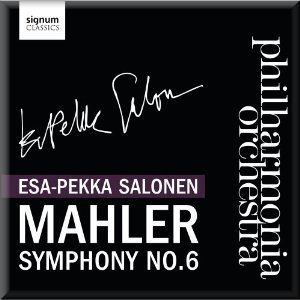 Please
note: because the debate over the position of the Scherzo
generates more heat than light, I�m not going to stick my neck
out except to say that Salonen places it second.
Please
note: because the debate over the position of the Scherzo
generates more heat than light, I�m not going to stick my neck
out except to say that Salonen places it second.
Like Tim Perry, I hadn�t originally expected too much from Salonen
in Mahler � hadn�t even listened to the recording from the Naxos
Music Library, much less requested it as a download for review
� but I�m glad that I read the review in which he explains the
reasons for making this his Recording of the Month.
Like John Quinn, I thought that I�d found my ideal recording
of this symphony in the Tennstedt performance on LPO-0038, also
a live performance, from 1983 (see September 2009 Roundup)
but Salonen runs him pretty close, is better recorded and is
available more economically, squeezed on one mid-price CD.
At the time of writing neither classicsonline.com nor eclassical.com
offered the download; the recording sounded more than adequate
as streamed from the Naxos Music Library, so you should be able
to buy the classicsonline.com download, at the full 320kb/s,
with confidence.
If you�re just looking for a download for your mp3 player, emusic.com
have this recording for a ridiculously inexpensive £1.68
or less at bit-rates around the 220kb/s mark. At that price
it would even do as a stop-gap for your main audio system.
Gustav MAHLER (1860 � 1911)
Kindertotenlieder (1901 � 1904) [26:17]
Lieder eines fahrenden Gesellen (1883 � 1885) [16:38]
Rückert-Lieder (1901 � 1904) [19:54]
Katarina Karnéus (mezzo)
Gothenburg Symphony Orchestra/Susanna Mälkki � rec. June
2007, January and August 2010. DDD
pdf booklet with texts and translations included.
BIS-SACD-1600 [64:11] � from eclassical.com
(mp3, 16- and 24- bit lossless)
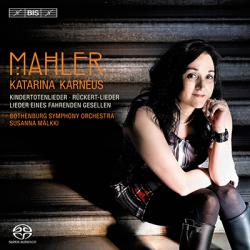 If
I was marginally less impressed than Göran Forlsing, who
made this his Recording of the Month, it�s probably
because there are two and a third other excellent older performances
buzzing around in my unconscious. Though past her excellent
best when she recorded Mahler for Decca, Kirsten Flagstad is
unforgettable and Janet Baker almost equally so; both could
sing the telephone directory and still get top marks from me.
For the Lieder eines fahrenden Gesellen, where I prefer
a male voice Fischer-Dieskau is unassailable. That said, though
I was slow to warm to Nun will die Sonn� so hell aufgehn
� not my favourite Mahler song, in any case � I soon began to
appreciate GF�s enthusiasm for Karnéus. In Lieder
eines fahrenden Gesellen she really comes gloriously into
her own in Ging heut� Morgen and the Rückert
Lieder, especially the closing Ich bin der Welt abhanden
gekommen, are all that I could wish � ethereal.
If
I was marginally less impressed than Göran Forlsing, who
made this his Recording of the Month, it�s probably
because there are two and a third other excellent older performances
buzzing around in my unconscious. Though past her excellent
best when she recorded Mahler for Decca, Kirsten Flagstad is
unforgettable and Janet Baker almost equally so; both could
sing the telephone directory and still get top marks from me.
For the Lieder eines fahrenden Gesellen, where I prefer
a male voice Fischer-Dieskau is unassailable. That said, though
I was slow to warm to Nun will die Sonn� so hell aufgehn
� not my favourite Mahler song, in any case � I soon began to
appreciate GF�s enthusiasm for Karnéus. In Lieder
eines fahrenden Gesellen she really comes gloriously into
her own in Ging heut� Morgen and the Rückert
Lieder, especially the closing Ich bin der Welt abhanden
gekommen, are all that I could wish � ethereal.
Those not afflicted by my ghosts from the past should purchase
with confidence. The well-balanced recording sounds very well
in the 24-bit lossless version, though there are no surround-sound
channels, and the booklet is very good.
Flagstad�s recordings of Kindertotenlieder and Lieder
eines fahrenden Gesellen plus Wagner�s Wesendonck Lieder,
etc. are available on Decca Eloquence 480 1796 (2 CDs, around
£9.50). Passionato.com offer a download of the earlier
single CD of the two Mahler cycles and the Wesendonck Lieder
(468 4862 mp3 or lossless � here).
Janet Baker�s recording of the three song cycles are on EMI
Great Recordings 5669812 for around £8. Amazon.co.uk offer
the download for £7.49, which isn�t much less than the
CD. HMV digital offer it twice � at £5.99 and £7.99!
Fischer-Dieskau�s versions of these three cycles come on DG
Originals 477 9375 and his Geselle is also available
coupled with Kubelík�s first-class account of the First
Symphony (DG Originals 449 7352).
Havergal BRIAN (1876 � 1972)
Orchestral Music Vol. 2: Music from the Operas
The Tigers: Symphonic Variations on �Has anybody here
seen Kelly?� (1921/2) [12:16]
Three Pieces from Turandot (1962/3) * [17:19]
Faust: Night Ride of Faust and Mephistopheles (1955/6)
* [5:21]
The Cenci: Preludio tragico (1951/2) * [13:42]
A Turandot Suite (1949 � 51) (arr. Malcolm MAcDONALD,
1975) * [22:10]
* first recordings
BBC Scottish Symphony Orchestra/Garry Walker � rec. 2009. DDD.
Pdf booklet included
TOCCATA CLASSICS TOCC0113 [17:48] � from toccataclassics.com
(mp3)
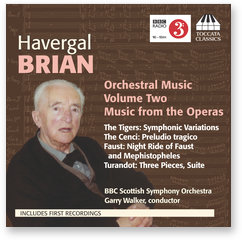 I
mentioned this briefly last month as an appendix to the Hyperion
recording of the Gothic Symphony. In some respects it�s
even more important than that release, since we already had
a more than serviceable account of the Gothic, whereas
all but one of the works included here are receiving their first
recordings. For all its unfamiliarity, the music is all well
worth hearing and the performances do it justice, while the
recording is much more than adequate, though the bit-rate is
only around 192kb/s. Theclassicalshop.net have this for download
� here
� in 320 kb/s mp3 and lossless sound.
I
mentioned this briefly last month as an appendix to the Hyperion
recording of the Gothic Symphony. In some respects it�s
even more important than that release, since we already had
a more than serviceable account of the Gothic, whereas
all but one of the works included here are receiving their first
recordings. For all its unfamiliarity, the music is all well
worth hearing and the performances do it justice, while the
recording is much more than adequate, though the bit-rate is
only around 192kb/s. Theclassicalshop.net have this for download
� here
� in 320 kb/s mp3 and lossless sound.
John IRELAND (1879 � 1962)
Violin Sonata No.1 in d minor (1909) [29:29]
Violin Sonata No.2 in a minor (1917) [28:30]
Bagatelle [2:40]
Michael Davis (violin); Harper Nelson (piano)
VIENNA MODERN MASTERS VMM2009 [60:32] � from classicsonline.com
(mp3) or stream from Naxos Music Library
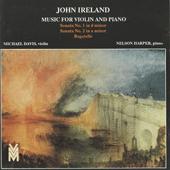 Though
available on disc for some time, this recording has just been
added to classicsonline.com and NML; though there are rivals,
it has a strong claim for consideration. I considered two inexpensive
rival versions, on Naxos (8.572497 Lucy Gould and Benjamin Frith)
and Hyperion Helios (CDH55164), in the August 2010 Roundup,
where you can also find links to other versions on Chandos and
Lyrita.
Though
available on disc for some time, this recording has just been
added to classicsonline.com and NML; though there are rivals,
it has a strong claim for consideration. I considered two inexpensive
rival versions, on Naxos (8.572497 Lucy Gould and Benjamin Frith)
and Hyperion Helios (CDH55164), in the August 2010 Roundup,
where you can also find links to other versions on Chandos and
Lyrita.
There is a pervasive myth that chamber music is somehow anaemic
and �intellectual�, the property of a chosen few. Nothing could
be further from the truth, as these two sonatas by John Ireland
amply demonstrate. The performances need to have some fire in
their belly � was that the reason for choosing the Turner painting
of Parliament on fire for the cover? � and on that count the
Vienna Modern Masters recording scores over the slightly less
powerful versions on Hyperion, with tempi generally midway between
that and the Naxos recording in No.1 and slightly more expansive
than either in No.2. The recording is good, though a little
less full than the Hyperion.
At £7.99 and in mp3 only, the price is less attractive
than that of the Naxos at £4.99 and the Hyperion at £5.99
(mp3 and lossless and with The Holy Boy as an attractive
extra). The Hyperion also comes complete with pdf booklet �
there are no notes with the Vienna Modern Masters download.
William Grant STILL (1895 �
1978)
Wood Notes (1947)* [16:32]
Symphony No. 2 in g minor �Song of a New Race� (1937) [27:05]
Symphony No. 3 �The Sunday Symphony� (1958) [18:01]
* World premiere recording
Fort Smith Symphony/John Jeter � rec. April 2011. DDD.
Pdf booklet included.
NAXOS AMERICAN CLASSICS 8.559676 [61:39] � from classicsonline.com
(mp3) or stream from Naxos Music Library
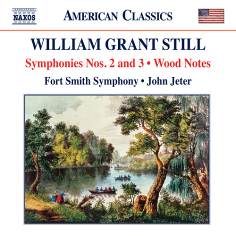 This
is the third and last but not least of three Naxos albums devoted
to the symphonies of William Grant Still, all performed by John
Jeter and the Fort Smith Symphony. The other volumes are:
This
is the third and last but not least of three Naxos albums devoted
to the symphonies of William Grant Still, all performed by John
Jeter and the Fort Smith Symphony. The other volumes are:
* In Memoriam; Africa (Symphonic Poem); Symphony
No.1 (Afro American Symphony)
NAXOS 8.559174 [60:09] � see very positive review
by John France and August 2009 Roundup.
* Symphony No.5 (Western Hemisphere); Poem for Orchestra;
Symphony No.4 (Autochthonous)
NAXOS 8.559603 [56:24] � see review
by Rob Barnett, who enjoyed the music and performances, and
review
by Nick Barnard who was somewhat disappointed.
Those earlier reviews have included information about the remarkable
William Grant Still which it would be superfluous to repeat
here. The new recording is most enjoyable: even though I slightly
prefer the Chandos recordings coupling Nos. 1 and 2 with music
by Duke Ellington (CHAN9154 and CHAN9226 � see
August 2009 Roundup)
there�s very little to choose and the Sunday Symphony
makes an attractive extra. If you choose the Naxos version of
the Afro-American Symphony, however, you must have the
alternative Chandos coupling of Ellington�s The River and
William Dawson�s Negro Folk Symphony on CHAN9909 with
Ellington�s Harlem and Solitude.
Richard ADDINSELL (1904 � 1977)
Film Music
Suite from Goodbye Mr Chips ** [10:14]
Warsaw Concerto from Dangerous Moonlight (arr. Roy
Douglas)† [8:25]
Suite from Love on the Dole ** [12:43]
From Blithe Spirit ** [9:54]
Suite from The Black Rose ** [7:43]
Suite from Scrooge (arr. Steven Bernstein) * 13:59
Overture: Tom Brown�s Schooldays ** [7:40]
From The Admirable Crichton ** 5:40
The Flame Tango from Out of the Clouds (arr. Robert
Sharples) [2:30]
** reconstructed by Philip Lane
Martin Roscoe (piano) †
Chetham�s Chamber Choir *
Manchester Cathedral Choir *
BBC Philharmonic/Rumon Gamba
Pdf booklet available
CHANDOS CHAN10046 [79:50] � from theclassicalshop.net
(mp3 and lossless) or stream from Naxos Music Library
[See joint 4-star reviews by Ian Lace and Gary Dalkin � here.]
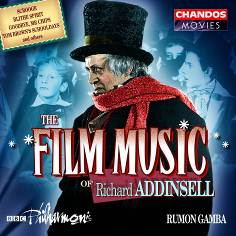 There�s
nothing at all taxing here, just well-crafted music of immediate
appeal. Spotting the influence is half the fun � that of Rachmaninov
on the Warsaw Concerto was never denied; in fact it was
stressed. For all that it�s no longer the subject of universal
adulation, as it was for years, this concerto can still span
the classical/popular divide in a �Friday Night is Music Night�
kind of way. Rumon Gamba and the BBC Phil are just the people
to do Addinsell�s music justice and they are ably abetted by
Roscoe in the Concerto and by the two choirs elsewhere.
The lossless download sounds very well, too.
There�s
nothing at all taxing here, just well-crafted music of immediate
appeal. Spotting the influence is half the fun � that of Rachmaninov
on the Warsaw Concerto was never denied; in fact it was
stressed. For all that it�s no longer the subject of universal
adulation, as it was for years, this concerto can still span
the classical/popular divide in a �Friday Night is Music Night�
kind of way. Rumon Gamba and the BBC Phil are just the people
to do Addinsell�s music justice and they are ably abetted by
Roscoe in the Concerto and by the two choirs elsewhere.
The lossless download sounds very well, too.
If you just want the Warsaw Concerto, you�ll find the
same recording on a 2-for-1 collection from the Chandos British
Film Music series on CHAN241-12 � download in mp3 or
lossless here.
Mark-Anthony TURNAGE (b. 1960)
A Constant Obsession: Chamber works
A Constant Obsession for tenor solo and eight players (2007)*
[22:21]
Three for Two for piano quartet (2010) [10:20]
Four Chants for violin and piano (2008) [9:51]
A Slow Pavane for piano trio (2004) [7:34]
Grazioso! for six players (2009) [9:03]
Nicky Spence (tenor)*
Chamber Domaine/Thomas Kemp (conductor & violin)
All tracks are world premiere recordings and were recorded in
the presence of the composer, June and October 2011.
Pdf booklet with texts included
RESONUS RES10106 [59:27] � download only (no CD) from
resonus.com in aac,
mp3 and lossless.
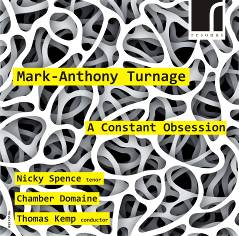 Resonus
have been very even-handed in offering new music and new slants
on older music, apparently with a policy of alternating the
two. Thus, they began by casting new light on Mendelssohn with
a recording of the original version of the Octet (RES10101)
which prompted me to proclaim them a most promising new label,
then followed up with music by Judith Bingham (RES10102). Now
they earn full marks again for enterprise by following Canite
Tuba for Advent and Christmas (RES10105) with unrecorded
music by contemporary composer Mark-Anthony Turnage, again to
be followed in February 2012 by the Ravel and Debussy Quartets.
Resonus
have been very even-handed in offering new music and new slants
on older music, apparently with a policy of alternating the
two. Thus, they began by casting new light on Mendelssohn with
a recording of the original version of the Octet (RES10101)
which prompted me to proclaim them a most promising new label,
then followed up with music by Judith Bingham (RES10102). Now
they earn full marks again for enterprise by following Canite
Tuba for Advent and Christmas (RES10105) with unrecorded
music by contemporary composer Mark-Anthony Turnage, again to
be followed in February 2012 by the Ravel and Debussy Quartets.
The avowed inspiration for the main work, A Constant Obsession,
is Benjamin Britten � a slightly more avant garde Britten,
it�s true, but the influence is clear, with the prominent part
for the horn particularly reminiscent of the mood of the Serenade
for tenor, horn and strings. I also hear the influence of other
20th-century English composers, not least Peter Warlock�s The
Curlew, in these settings of the works of Keats, Hardy,
Edward Thomas, Graves and Tennyson. With the underlying theme
of unrequited love, it�s music to make you take notice rather
than to enjoy and it receives a powerful performance. Dare I
upset fans of Peter Pears by saying that I�d like to hear Nicky
Spence now in preference to him in that Britten Serenade?
All the music here will take a little while to gel with me but
I�m sure that most of it will do so in due course � I�m a little
slow to take new music on board, but nothing here strikes me
as unlikely to do so, especially as much of it is not a million
miles away from the idiom of classical jazz and the jazz-inspired
music of Ravel. Some of it, like the third part of Three
for Two, originally intended for the opera Anna Nicole,
is immediate in appeal. As all the performances here were recorded
in the presence of the composer, they are, presumably, authoritative.
The recording to which I listened in 16-bit flac is excellent;
it was made in the friendly acoustic of St Augustine�s, Kilburn,
London.
Like all Resonus recording, this comes in download form only,
from the company�s own website in aac, mp3 and flac � here
� in mp3 only from classicsonline.com with 24-bit lossless from
theclassicalshop.net, linnrecords.com and eclassical.com � all
to appear later. The album will be available from resonus.com
early in January 2012; some of these proxy sites may take a
little longer. The booklet with texts comes with the download
in all cases.
Treasures of Christ Church
George Frideric HANDEL (1685 �
1759) Zadok the priest [5.41]
William WALTON (1902 � 1983)
Set me as a seal [3.35]
Thomas TALLIS (c.1505 � 1585)
Salvator mundi [3.44]
Henry PURCELL (1659 � 1695)
O God, thou art my God [3.55]
Robert PARSONS (c.1530 � 1570)
Ave Maria [4.44]
Benjamin BRITTEN (1913 � 1976)
A shepherd�s carol 4.55
Herbert HOWELLS (1892 � 1983)
Like as the hart [6.14]
John TAVENER (b.1944) The
Lord�s prayer [2.34]
John TAVERNER (c.1490 � 1545)
Christe Jesu [3.24]
Francis GRIER (b.1955) My
breath lies quiet [1.56]
Peter WARLOCK (1894 � 1930)
Bethlehem Down [4.15]
John RUTTER (b.1945) Canticle
of the heavenly city [6.23]
William BYRD (1543 � 1623)
O Lord, make thy servant, Elizabeth our Queen [2.57]
Traditional, arr. Stephen DARLINGTON
(b.1952) Jacob�s ladder [2.44]
Orlando GIBBONS (1583 � 1625)
Great Lord of Lords [4.46]
Howard GOODALL (b.1958) Veni,
Sancte Spiritus [4.45]
Thomas WEELKES (c.1576 � 1623)
Hosanna to the Son of David 1.50
The Choir of Christ Church Cathedral, Oxford/Stephen Darlington
� rec. March 2011. DDD.
Pdf booklet with texts included.
AVIE AV2215 [68:43] � from classicsonline.com
(mp3) or stream from Naxos Music Library.
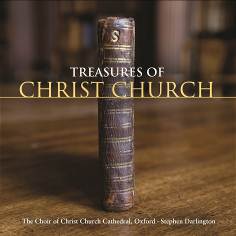 My
Christmas selections included an inordinate amount of music
from Cambridge and very little from Oxford, so I�m going to
redress the balance by opening the New Year with this excellent
anthology from the Christ Church Choir, recorded not at The
House itself but in the more recording-friendly acoustic of
Merton College next door. It contains an excellent sampler of
English church music, stylishly performed and well recorded.
I�d have preferred a chronological approach rather than the
hither-and-thither placement, but that�s about my only reservation
and the arrangement allows the two distantly-related Tave(r)ners
to be placed back to back.
My
Christmas selections included an inordinate amount of music
from Cambridge and very little from Oxford, so I�m going to
redress the balance by opening the New Year with this excellent
anthology from the Christ Church Choir, recorded not at The
House itself but in the more recording-friendly acoustic of
Merton College next door. It contains an excellent sampler of
English church music, stylishly performed and well recorded.
I�d have preferred a chronological approach rather than the
hither-and-thither placement, but that�s about my only reservation
and the arrangement allows the two distantly-related Tave(r)ners
to be placed back to back.
The Christ Church pedigree is well maintained, with music from
the first choirmaster of what was then Cardinal College, Taverner,
two of his modern successors, Grier and Darlington, and Walton
who sang in the choir before and as an undergraduate.
Don�t forget the wonderful Christ Church recording of Masters
of the English Renaissance on Regis RRC1320, available
for just £4.99 from
classicsonline.com (mp3), complete with booklet, which duplicates
only the Parsons Ave Maria on the new Avie recording.












